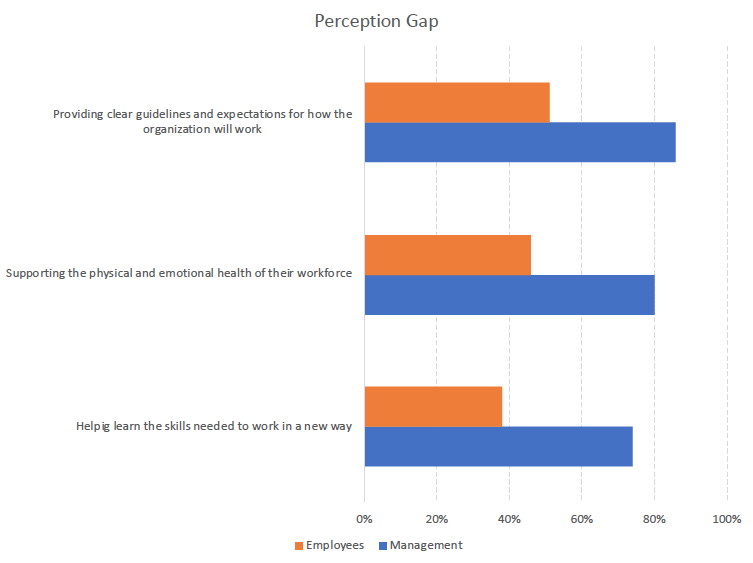As I have said repeatedly, COVID is accelerating change for all businesses, whether or not they recognize it. A recent survey by the IBM Institute of Business Value concluded that “executives must accept that pandemic-induced changes in strategy, management, operations, and budgetary priorities are here to stay.” I see three significant shifts taking place.
- How CEOs Lead
- Changes in priorities
- Changes in business models.
How CEOs Lead
- Unlocking bolder (“10x”) aspirations. COVID caused most CEOs to question their assumptions about the pace and magnitude change attainable. The realization that a change in mindset can dramatically affect goal setting and the operating model, many CEOs are effecting changes in a few months that companies previously assumed would take years. The speed for many of these changes is down to employees working longer and harder; however, many CEOs also recognize that many employees have more time available with the stop in travel.
- Elevating their “to be” list to the same level as “to do” in their operating models. With COVID, leadership has to change. CEOs’ priorities were setting up strategy, culture, and making people decisions at regular times. However, now it about maintaining morale and ensuring employees are prepared for whatever may come in the face of uncertainty. Thus, leaders are changing how they and their senior management team show up. Leaders now need to be empathetic and offer words of encouragement. According to Lance Fritz, CEO of Union Pacific, “[Employees] need to see that their leadership is vulnerable, empathetic, and making decisions in accordance with our values, which I’d better be the living proof of.”
- Fully embracing stakeholder capitalism. While I have also previously discussed embracing stakeholder capitalism; however, COVID has accelerated this trend as it has emphatically affirmed the interconnection and interdependence of businesses with their full range of stakeholders. CEOs are confronting tough decisions with profound human consequences every day. CEOs have realized that their choices are affecting their employees, communities, and suppliers. How they behave will have a long term effect on their business, especially as 87 percent of customers say that they will purchase from companies that support what they care about.
- Harnessing the full power of their CEO peer networks. As a result of COVID, CEOs talk to one another much more and at a much greater rate. The belief is, “Let’s learn from each other. Let’s hold hands. Let’s commiserate.” They are achieving this through informal networks and groups like Vistage. The power of a Peer group where you can be vulnerable and get input into these hard decisions is immense. CEOs don’t have to feel like they are carrying all the weight themselves. During the Great Recession, Vistage member companies outperformed non-Vistage member companies [. ]
Changes in Priorities
Not only are CEOs changing the way they lead, but companies are finding that their priorities have changed dramatically! According to the recent IBM survey, companies will focus more inwardly over the next two years. Their top priorities now are:
| 87% | Cost Management |
| 87% | Enterprise Agility |
| 86% | Cash Flow and Liquidity Management |
| 84% | Customer Experience Management |
| 76% | Cybersecurity |
| 75% | I.T. Resiliency |
| 65% | IoT, Cloud and Mobility |
| 58% | New Product Development |
| 52% | New Market Entry |
As companies move away from just-in-time delivery, 40% of those surveyed identified the need for space capacity in their supply chains. However, about 60% said they were accelerating their organizations’ digital transformation, and three-quarters plan on building more robust I.T. capabilities.
Changes in Business Models
Finally, many companies have also changed their business models to address market changes resulting from COVID, including some clients. Some of the creative pivots are:
- Mandarin Oriental. As mentioned last week, many high-end hotel chains are supplying alternative residences for the wealthy. MO has not only done that; it seeks to deliver the luxury experience where you are rather than at a destination. The company promotes “Staycations at M.O.” at its properties if there is one in your city. These staycations offer early check-in, late check-out, a free bottle of wine, and credits for other purchases. However, if you don’t want to leave you home, MO says, “Just call room service.” They will deliver food, items from the cake shop, supplies from the spa, or other merchandise to your house.
- JD.com. For producers of alcoholic beverages, COVID was a considerable blow. During the Chinese shutdown, its e-commerce giant, JD.com, go D.J.s and performers to stage three hour live show online. During these shows, viewers could purchase alcoholic beverages from Rémy Martin to Budweiser and have it delivered to their doors with a single click. As a result, whiskey sales from “a single partner brand” increased eightfold during a day with the show. As a result, JD.com plans to continue its live music events but to expand the products it offers.
- David Dodge. As auto sales plunged nationwide, according to the Washington Post reports David Dodge in Glen Mills, Pa., the auto dealership sold more cars in July than in any previous month in its 15-year existence. David Kelleher, David Dodge’s owner, pivoted to meet the changing market. The company created a business development center to consolidate online leads and located it prominently just inside the front door. Salespeople now work phones, email, texts, and Zoom. They are using FaceTime to accompany customers on test drives. For those customers who want to stay socially distant, David Dodge allows the whole process online, and they deliver the vehicle to the customer’s home. Kelleher and his top salesperson, Mike McVeigh, doesn’t expect to return to the old ways once COVID is behind them.
- Chipotle Mexican Grill. For a company that had been struggling with several crises over the last few years, when COVID hit, Chipotle new it had to change its business model to survive. The model was for pickup orders to be its lifeline. The company added “digital kitchens,” which handle online orders for pickup, at those restaurants that didn’t already have them, to enable this pivot. In May, Chipotle announced it would add 8,000 new workers to meet the growing demand. In July, it needed to hire 10,000 more. The company has aggressively added “Chipotlanes,” drive-thru lanes exclusively for picking up digital orders. That business model requires more employees than traditional stores—hence all that hiring is much more profitable.
Cause for Concern
All these changes are requiring more from employees in terms of working longer and harder. As I have noted on numerous occasions, empathy is needed, and burnout is a huge issue. What is worrying is that IBM’s research, drawing from other surveys that included employees, found a disturbing wide gap between “employers significantly overestimating the effectiveness of their support and training efforts” and how employees feel about these measures.

Source: IBM Institute of Business Value
As CEOs and leaders, it is critical that as you face COVID and plan for changes in leadership style, changes in priorities, and pivots in your business model, you need to do more for your employees. They are scared, uncertain, working from with kids doing school virtually, potentially overwhelming debt (see below), and they need management to support them. Those leaders who don’t rise to this challenge will see the good employees leave and create a reputation stain that could last a generation.
Recent Posts
Align and Thrive: The Importance of Organizational Alignment and Agility
Discover the importance of organizational alignment and agility in this blog post. Learn how establishing a strong CORE and building a strategy around it can lead to sustainable growth and success. Find out how alignment and agility empower your organization to thrive in an ever-changing business landscape.
How to Achieve Smart Time Management: 10 Tips for Busy Professionals
When you are a busy professional running your own business, it can often feel like there aren’t enough hours in the day to accomplish everything. Being strategic with your time is the best (and possibly the only) way to achieve all of your daily tasks. If you are...
5 Strategic Leadership Skills Every Manager Needs
So often, people view leadership as a talent: you’re either born with this quality or you’re not. However, this is not always the case! In reality, good leadership is made up of skills, and anyone can learn how to improve. Some people may pick up leadership attributes...
How the Sellability Score is Calculated: The Ultimate Guide
Do you have questions about how to calculate your business’s sellability score? Whether you’re looking to sell your business in the near future or years from now, understanding your sellability score will help you thrive. The sellability score identifies the...
The Top 5 Benefits of the Entrepreneurial Operating System
As an entrepreneur running your own business, you know there are bumps in the road and struggles that both you and your business will face over time. However, with the right people and tools at your disposal, you can anticipate what’s coming, plan for it, and continue...
5 Ways to Use Email Automation to Boost Traffic
Every single business in the world wants to evolve and grow. This will happen using a variety of techniques and strategies. In 2022, digital marketing is more than a household name, and most companies will adopt at least a few ideas when long-term planning and coming...
6 Questions To Ask A Potential Business Coach Before Hiring Them
Many entrepreneurs consider executive business coaching when they start struggling on their professional path. A small business coach is an experienced professional mentor who educates, supports, and motivates entrepreneurs. They will listen to your concerns, assess...
3 Ways Proper Long Term Strategic Planning Helps Your Business
Dreams turn into goals when they have a foundation of long-term strategic planning supporting them. They become reality when the ensuing strategic implementation plan is executed properly. With Kaizen Solutions as their strategic planning consultant, small and...
What is a Peer Group, and How Can it Improve Your Career?
If you are a CEO or key executive who has come to a crossroads or crisis in your career, you'll gain valuable insights and solutions from a peer group connection more than anywhere else. But what is a peer group, and how can that statement be made with so much...
Profit and Revenue are Lousy Core Values
As I mentioned last week, I am down with COVID and tired, so spending more time reading rather than working. I read Bill Browder's Freezing Order this weekend, and I highly recommend it. However, at the end of the book, Browder says that oligarchs, autocrats, and...










